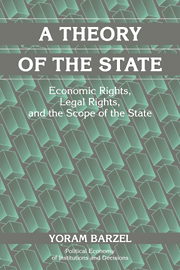Book contents
- Frontmatter
- Contents
- Preface
- 1 Introduction
- I The Emergence of Protection and Third-Party Enforcement
- 2 The State and the Enforcement of Agreements
- 3 Third-Party Enforcement and the State
- 4 The Choice among Enforcement Forms
- 5 Anonymous Exchange, Mixed Enforcement, and Vertical Integration
- 6 Jurisdictional Issues
- 7 Collective Action and Collective Decisions
- 8 Tying the Protector's Hands: The Agreement between Subjects and Protector
- II The Emergence of Legal Institutions
- III The Character of the State
- References
- Index
- Other Books in the Series
3 - Third-Party Enforcement and the State
Published online by Cambridge University Press: 04 December 2009
- Frontmatter
- Contents
- Preface
- 1 Introduction
- I The Emergence of Protection and Third-Party Enforcement
- 2 The State and the Enforcement of Agreements
- 3 Third-Party Enforcement and the State
- 4 The Choice among Enforcement Forms
- 5 Anonymous Exchange, Mixed Enforcement, and Vertical Integration
- 6 Jurisdictional Issues
- 7 Collective Action and Collective Decisions
- 8 Tying the Protector's Hands: The Agreement between Subjects and Protector
- II The Emergence of Legal Institutions
- III The Character of the State
- References
- Index
- Other Books in the Series
Summary
INTRODUCTION
Realizing the gains to be had from specialization requires exchange, and exchange agreements must be enforced. The parties themselves may enforce the agreements. Self-enforcement, however, works well only for some agreements. Third-party enforcement often works better, because third parties are able to provide the principals to an agreement an altered set of incentives such that their net gains from interacting will exceed those they could attain under self-enforcement. Third-party enforcement, however, is costly and will not be used in all cases.
Third-party enforcers impose costs, either by the use of violence or through long-term relations. The distinction between the two types of enforcers is fundamental to the theory of the state, because there are differences between the kinds of agreements they can enforce, as well as differences in their capacities to abuse their own power.
In this chapter I first argue that many different individuals and organizations, each with their comparative advantages, can supply thirdparty enforcement services. Third parties can follow one of two radically different sets of measures for imposing costs. One set imposes costs by limiting or reducing the extent of valuable long-term relationships between the enforced party and its outside trading partners. The ability to do so requires that the enforcer and the enforced maintain a longterm relationship. The other set of measures is used where there are no enduring direct relationships between the enforcers and the enforced parties. In this case the enforcers impose costs by inflicting harm. This latter enforcement form is at the heart of the state.
I continue by exploring two central themes: the nature of third-party enforcement and the commonality and differences between the two thirdparty enforcement modes described.
- Type
- Chapter
- Information
- A Theory of the StateEconomic Rights, Legal Rights, and the Scope of the State, pp. 34 - 58Publisher: Cambridge University PressPrint publication year: 2001



